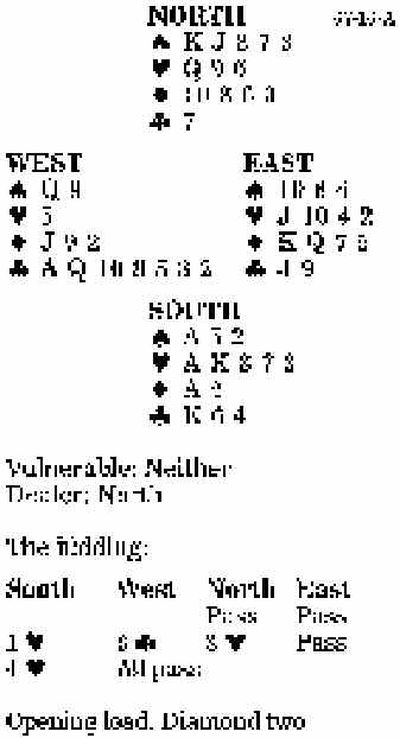Bridge

Today’s deal from last year’s Long Beach Nationals sees Steve Beatty at the helm in a difficult game from a knockout match, taking what looks to be a line inspired by excellent peripheral vision. However, on review, he was simply using cold hard logic to make the right play.
In the other room the three-no-trump contract reached by Beatty’s opponents had proved very straightforward when the spades behaved. By contrast, four hearts on a diamond lead to East’s queen looked more challenging – particularly since if West had diamond length, as appeared likely, at least one of the majors would not split.
Since West had not led a singleton spade, Beatty started off by leading a spade to dummy’s jack. When this held, West was then known to have at least two spades; thus a bad trump break was almost guaranteed. So Beatty’s next move was entirely logical – he ran the heart nine from dummy! He could see that even if West could win and lead a diamond to East for a club shift, there would still be a trump in dummy to cope with that suit. However, had he drawn trumps at once, a 4-1 heart split would have been fatal, since there would have been no trumps left on the board to deal with the opponents’ clubs.
As it was, the heart nine won the trick – and East could be seen holding his cards closer to his chest for the rest of the match!
Bid with the aces
South holds:
| “K J 8 7 3 | |
| “Q 9 6 | |
| “10 8 6 3 | |
| “7 |
| South | West | North | East |
| 1 “ | Dbl. | Pass | |
| 1 “ | Pass | 2 “ | Pass |
| ? |
Answer: Bid four spades. Your partner’s two-spade call in an uncontested sequence is a game-try, suggesting extras with four trumps. You have more than enough to accept any invitation to game in the context of having already limited your hand to nine points or so.